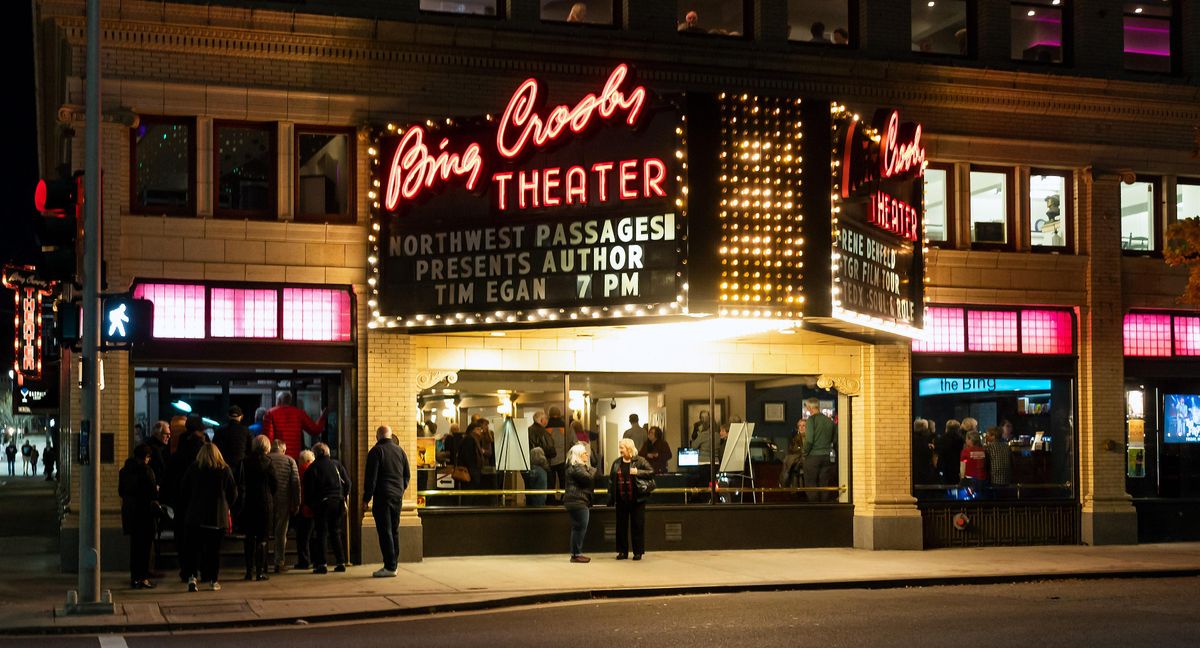Timothy Egan shares stories of spiritual journey in hometown return to Spokane

Pulitzer Prize-winning author and Spokane native Timothy Egan brought his sense of humor with him Tuesday when he spoke to a packed house at the Bing Crosby Theater about the future of the Catholic Church, his admiration for Pope Francis and walking until his toes turned to hamburger.
Egan is promoting his ninth book, “A Pilgrimage to Eternity,” about his physical and spiritual journey along the Via Francigena, a 1,300-mile route that stretches from the English city of Canterbury to Rome.
“If you walked this thing in the Middle Ages, you thought all your sins were forgiven,” he said.
He calls himself a lapsed, listening Catholic and decided he needed to make the spiritual journey after his mother died in 2012. She was a devout Catholic, yet on her deathbed expressed doubt about what came next.
“That’s the first time I heard any doubt from her,” he said.
Egan said he hadn’t thought about religion in a long time, but her words sparked a desire to figure things out. He said he was wary of staying in the endless whirlpool of agnosticism.
“You can park yourself there and never get out of it,” he said.
Egan decided what he would do on his pilgrimage before he began.
“I’m going to decide what I believe,” he said. “I’m going to press it one way or another.”
Egan originally wanted to use his book to tell the history of Christianity. He does that, but he also includes personal insights about how the journey affected him. His anecdotes in the book and on stage showed his humor, such as the time he asked a monk in a monastery where he was spending the night if there was Wi-Fi.
“I just can’t get the smart ass out of me,” he said. “He almost threw me out.”

On stage Tuesday, Egan talked about the issues that have been confronting the Catholic Church.
“You know how many times Jesus Christ condemns homosexuality?” Egan said. “Zero. He said absolutely nothing about it … He certainly doesn’t preach hate toward gay people.”
He pointed to a recent survey that shows 40% of millennials are not part of any organized religion. He said he thinks it’s because they see the hypocrisy of Christians who preach one thing and do another.
“That doesn’t mean they’re not spiritual,” he said. “I just think they’re checking out of organized religion.”
The Catholic Church, in particular, is dealing with the fallout from decades of sexual abuse and cover-up.
“I honestly don’t know if it can survive,” he said.
Egan’s journey led to some changes, including his attitude toward miracles. He was originally a skeptic, but said he came to agree with St. Augustine’s view.
“Miracles are not contrary to nature,” he said. “They’re just contrary to what we know about nature.”
Egan recounted an experience he had on the Via Francigena that he describes as a miracle. He visited a church in Montefiascone, Italy, where the body of St. Lucia Filippini lies in a crypt. Catholics believe in incorruptibility, Egan said, which is the idea that if you live a saintly life your body will not decay.
He approached the saint’s crypt, where she lay on her side, and jumped back when her eyes appeared to open. He took a few photos and her eyes closed. He said he ran back to his hotel to share the experience with his wife, who was skeptical. At the end of the trip, Egan said he was told that another pilgrim had the same experience.
“I have to say I do believe in miracles,” he said.
Egan kept a few things close to his vest during Tuesday’s talk, including whether he was able to meet the pope.
“I played every Jesuit card I had,” he said. “I’m not going to tell you how that turned out.”
An audience member asked Egan how he would describe his faith now, but he wouldn’t say.
“One of the cardinal rules as a storyteller is not to give away the ending,” he said.